It seems we can’t find what you’re looking for. Perhaps searching can help.
Sign Up for newsletter!
Subscribe to get the latest eBook!
Hotline






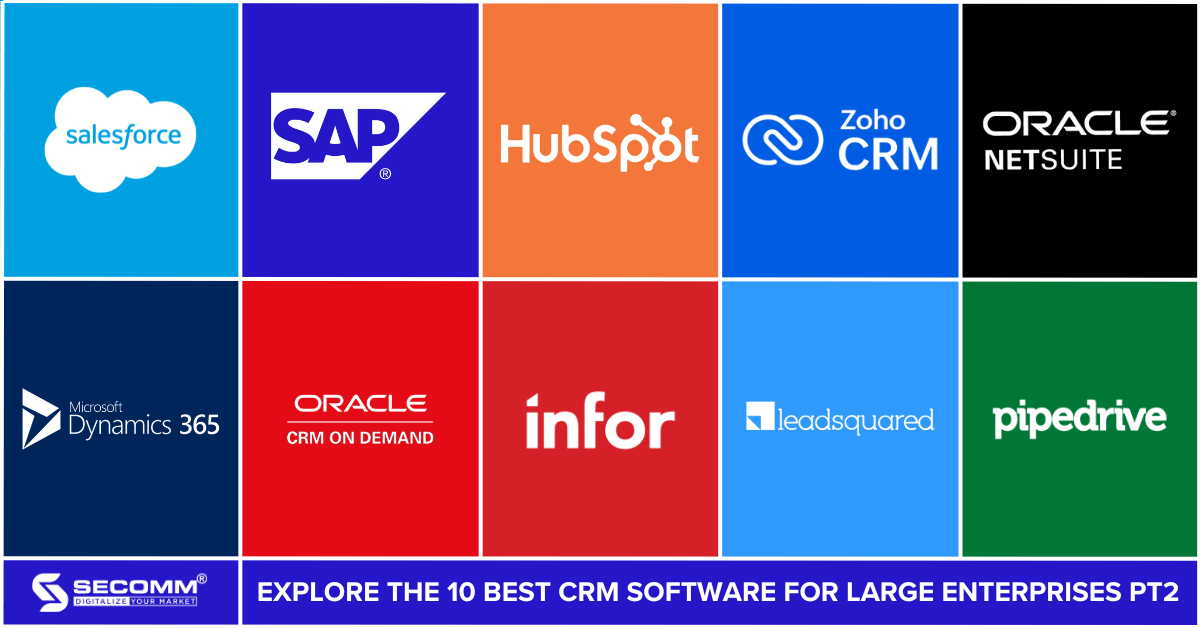
The recent surge in prioritizing customer experience has significantly impacted the evolution of eCommerce. Therefore, choosing the right CRM among various CRM software solutions to effectively manage customer relationships is crucial.
Following Part 1, here are 5 other CRM software options for large enterprises worth considering.
Dynamics 365 Sales is a comprehensive Customer Relationship Management (CRM) solution developed by Microsoft. The software is designed to assist businesses in managing and streamlining customer interactions, enhancing the sales process’s efficiency.
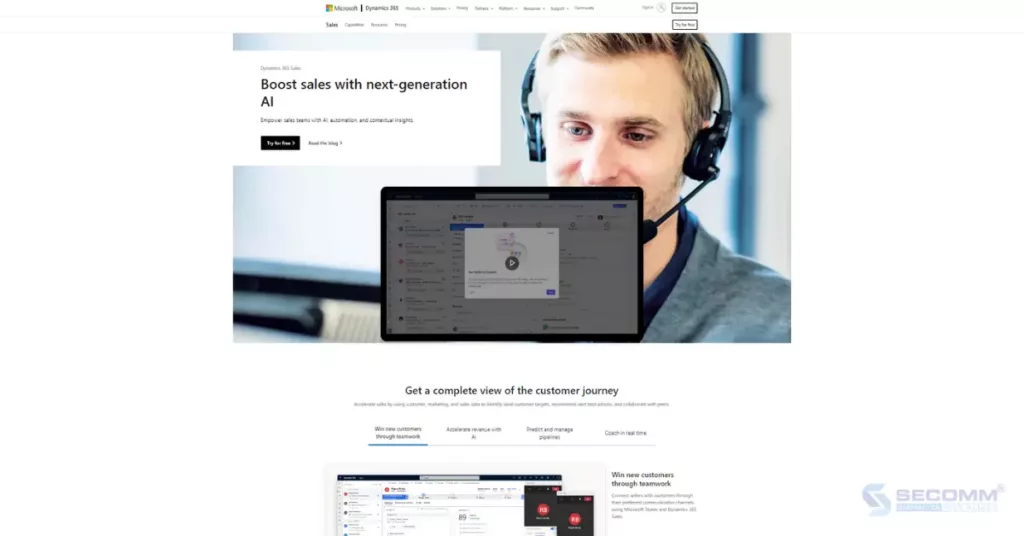
Its notable capability for scalability and flexible customization has made Dynamics 365 Sales one of the most suitable choices for the complex deployment needs of large enterprises.
Core features:
Costs:
| Dynamics 365 Sales Professional | Dynamics 365 Sales Enterprise | Dynamics 365 Sales Premium | Microsoft Relationship Sales |
| $65/user/month | $95/user/month | $135/user/month | $162/user/month |
Pros:
Cons:
Oracle CRM On Demand is a cloud-based CRM designed to assist businesses in managing sales activities, marketing, and customer interactions, and providing in-depth analytical reporting. It is the SaaS version of Oracle’s renowned on-premise software, Siebel CRM. Businesses can use both of these software applications and link them through the ‘Oracle Application Integration Architecture’ and ‘Oracle Fusion Middleware’ software.
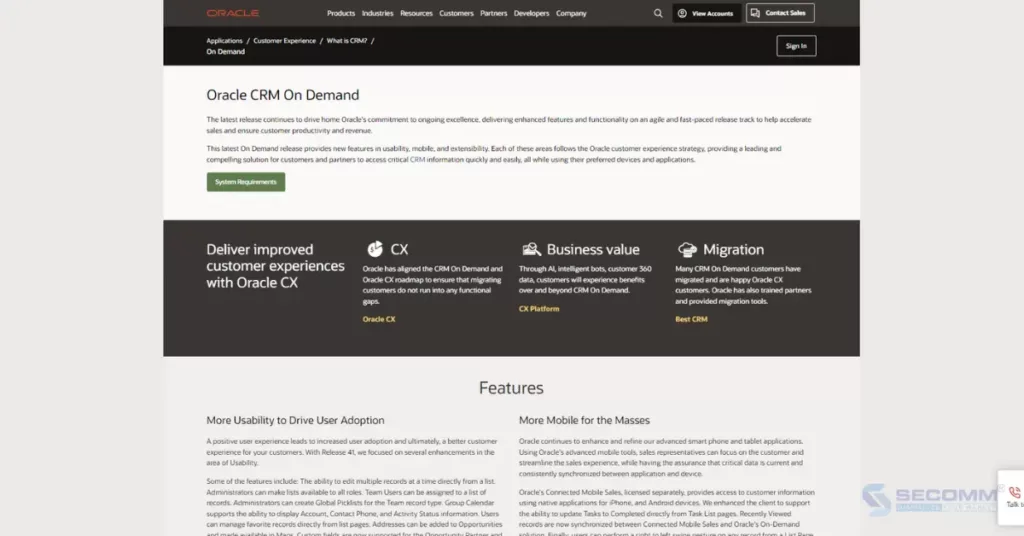
Core features:
Costs: Oracle CRM On Demand doesn’t publicly disclose its pricing on the website. Therefore, businesses are advised to contact the provider directly for consultation and a price quote.
Pros:
Cons:
Related Reading: On-Premise CRM vs On-Cloud CRM: Key Differences
Infor CRM is a cloud-based customer relationship management (CRM) software designed to assist large businesses in developing and maintaining customer relationships.
Infor CRM is known for its flexibility, scalability, and high configurability, offering a range of features to help businesses better understand their customers, personalize customer experiences, and enhance the effectiveness of sales operations.
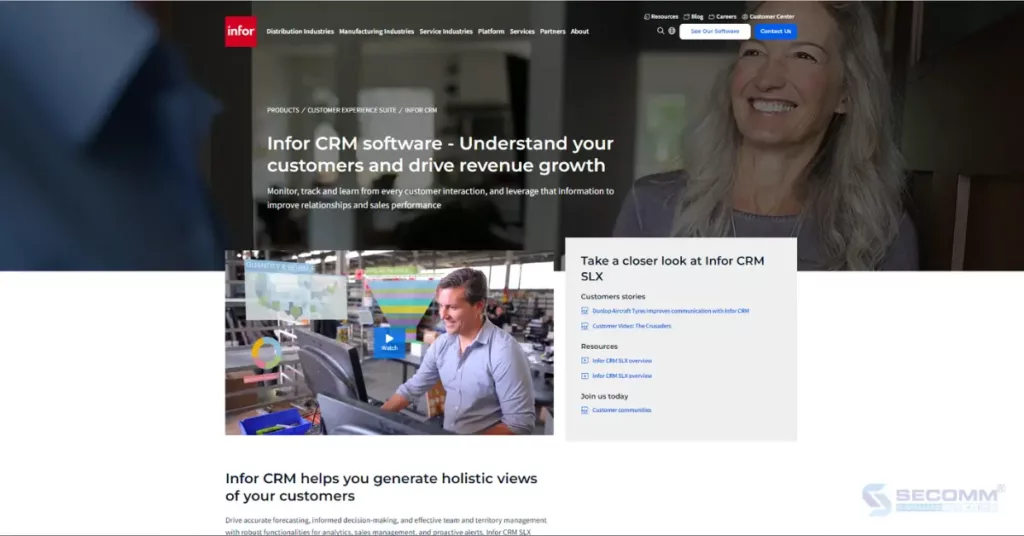
Core features:
Costs: Infor CRM doesn’t publicly disclose its pricing on the website. Therefore, businesses are advised to contact the provider directly for consultation and a price quote.
Pros:
Cons:
LeadSquared Sales + Mobile CRM is a cloud-based CRM solution that enables businesses to enhance sales productivity and manage relationships with customers and potential customers.
This CRM solution integrates the features of Sales CRM and Mobile CRM, allowing businesses to access customer data and perform essential sales tasks from anywhere, at any time.
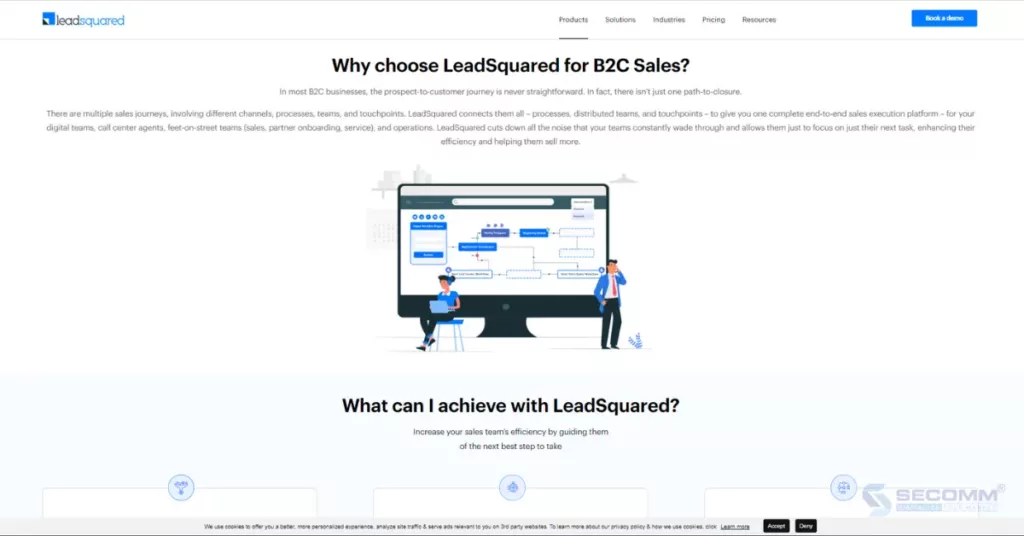
Core features:
Costs:
| Lite | Pro | Super | Ultimate |
| $25/user/month | $50/user/month | $100/user/month | Custom |
Pros:
Cons:
Pipedrive is a popular CRM software solution used by businesses of all sizes and industries. In recent times, large enterprises have shown particular favor for Pipedrive CRM due to its advanced features that assist in managing sales opportunities and swiftly converting potential customers into clients.
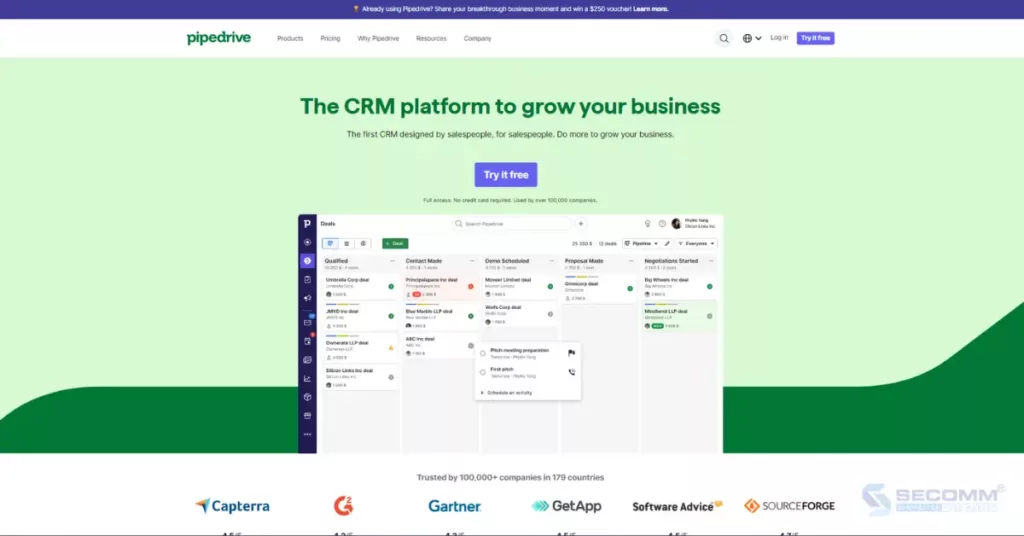
Core features:
Costs:
| Pricing plans | Essential | Advanced | Professional | Power | Enterprise |
| Billed Monthly | $15/user/month | $29/user/month | $59/user/month | $69/user/month | $99/user/month |
| Billed Yearly | $12.50/user/month | $24.90/user/month | $49.90/user/month | $59.90/user/month | $74.90/user/month |
Pros:
Cons:
Choose the best CRM software!
So, the article about the 10 CRM software systems part 1 + part 2 has come to a close with the hope that businesses will choose a platform suitable for their development needs.
By implementing a CRM solution, businesses can quickly build and develop relationships with customers while enhancing collaboration among internal departments.
Contact or call SECOMM’s Hotline directly at (02871089908) for advice and CRM implementation.
 2
2
 13,842
13,842
 0
0
 1
1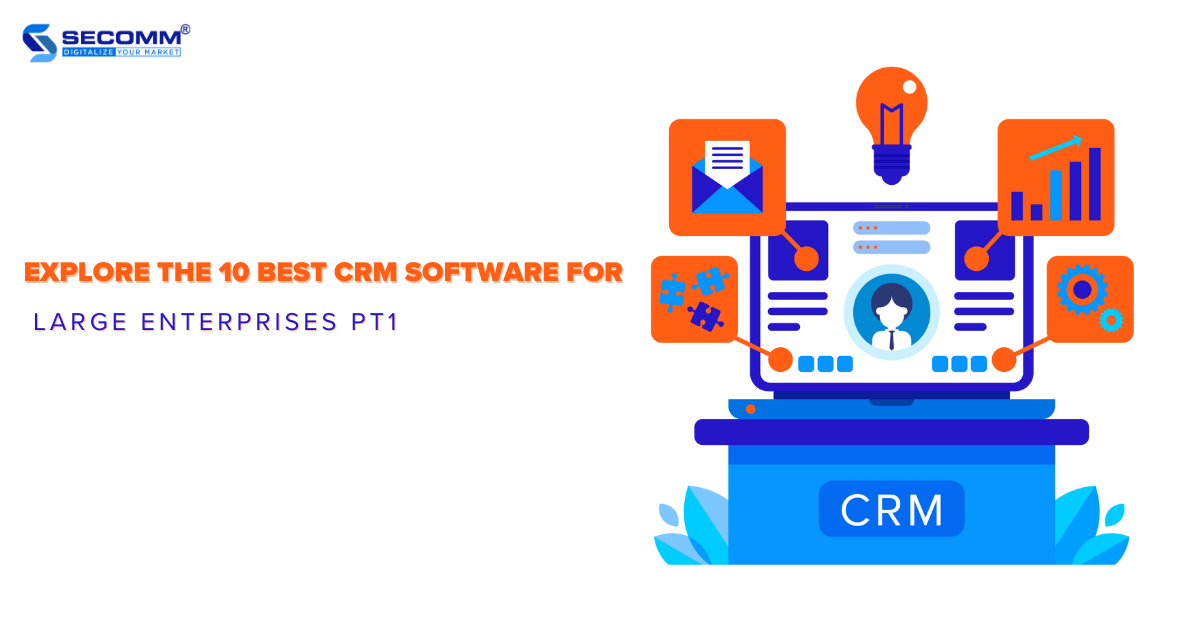
The options for CRM solutions are expanding and becoming more diverse. In reality, some currently popular CRM software may lack the flexibility to meet the complex deployment requirements of large businesses.
Nevertheless, there are CRM software designed to offer a digital infrastructure, in-depth technical support, and exceptional features, granting significant customization freedom for large enterprises.
The article below focuses on providing important considerations when choosing CRM solutions and lists the 5 best enterprise CRM software.
The first important step before selecting CRM software is to clarify the needs and deployment expectations. You can review and assess the pros and cons of the current tools and management programs in use. Following this, the focus should be on the aspects requiring modification or enhancement, all while estimating the customization needs.
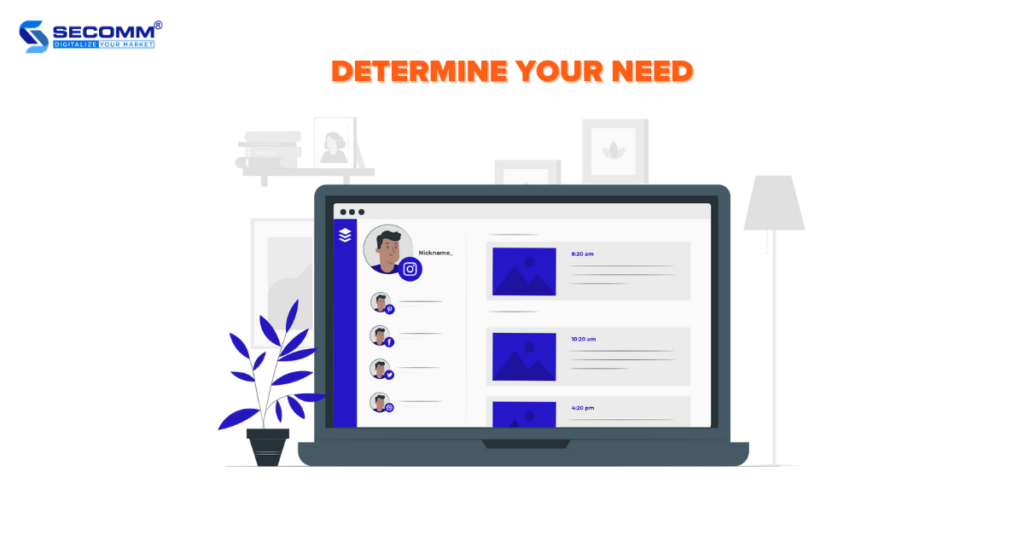
Next, you need to the type of software to deploy, which may be either On-premise or On-cloud CRM software. These two software types come with key differences.
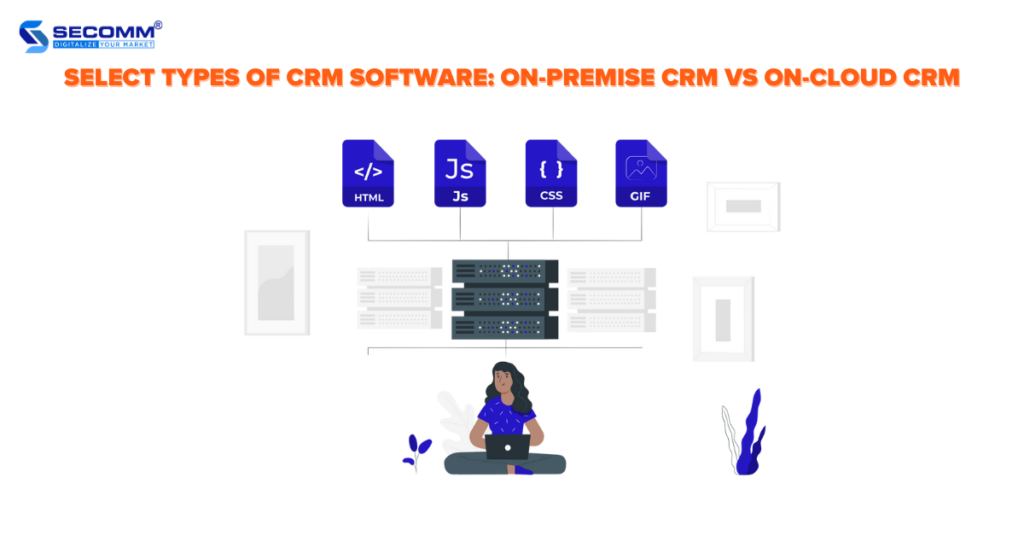
For On-cloud CRM, the entire data and software system are stored and managed by a third-party service provider, allowing you to access it through a web browser or mobile application.
Some advantages of On-cloud CRM include:
On the other hand, On-premise CRM stores and manages the entire data and software system locally on the company’s servers and infrastructure.
Some advantages of On-premise CRM include:
Related Reading: On-Premise CRM vs On-Cloud CRM: Key Differences
A user-friendly CRM software accessible to users of all skill levels contributes to expediting the deployment process effectively. Specifically, the software interface should be intuitive, easy to install, and allow for seamless import and export of any data type without requiring excessive assistance.
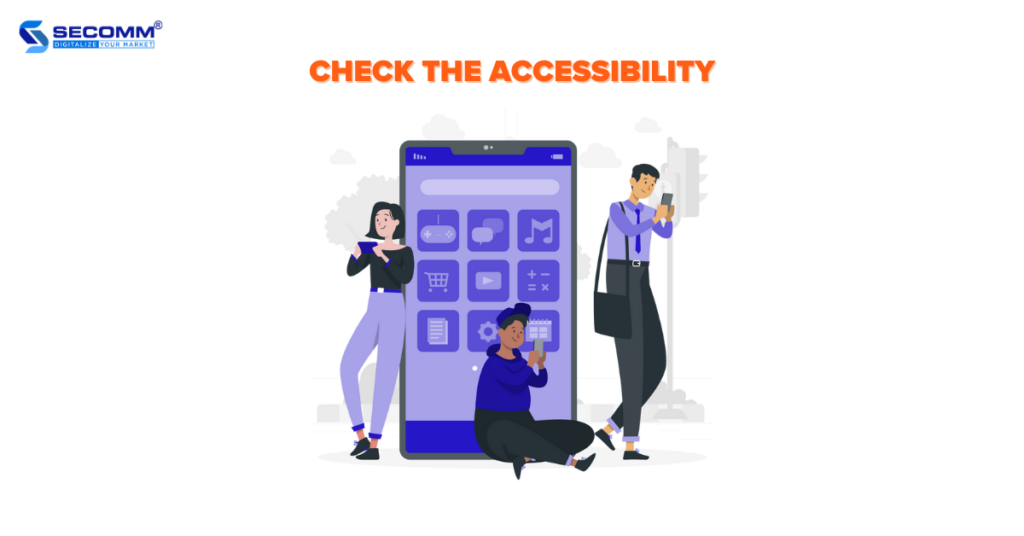
Moreover, businesses should opt for CRM software that is flexible enough to synchronize with their existing operational processes. Typically, the majority of CRM solutions nowadays offer a free trial period of three or four weeks. This timeframe is sufficient for businesses to understand the software’s functionality and assess whether it is the optimal choice for their deployment needs.
Customization is a vital feature of CRM software. Because each business has different models and scales, it’s essential to select CRM software that offers customization capabilities to match your business requirements and smoothly manage your sales processes.
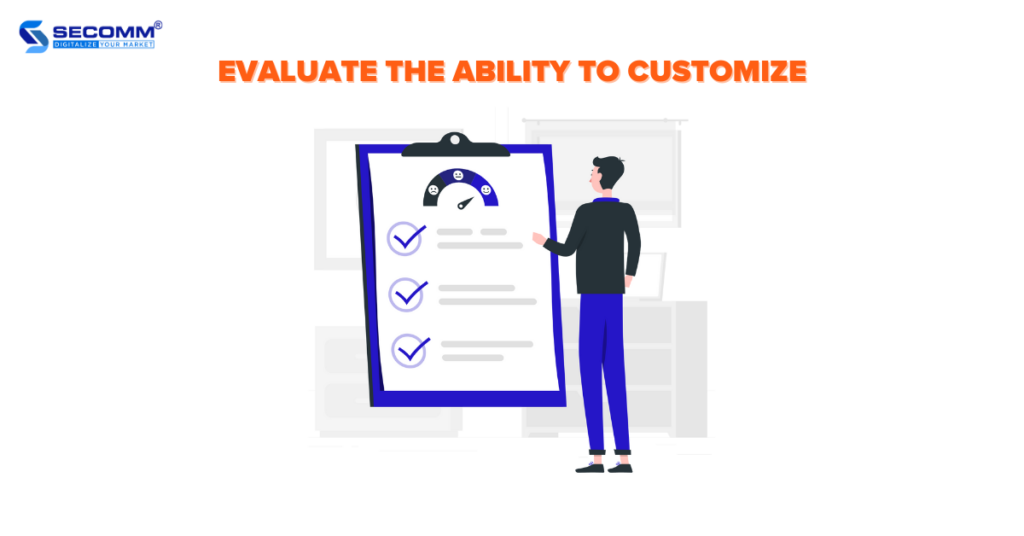
Most CRM software designed for large-scale businesses offers customization capabilities. Nevertheless, while CRM solutions with extensive customization features can facilitate flexible deployment to meet specific needs, they often come with a higher price point.
The most crucial information stored in CRM software is customer data. Therefore, when selecting a CRM solution, you need to prioritize security.
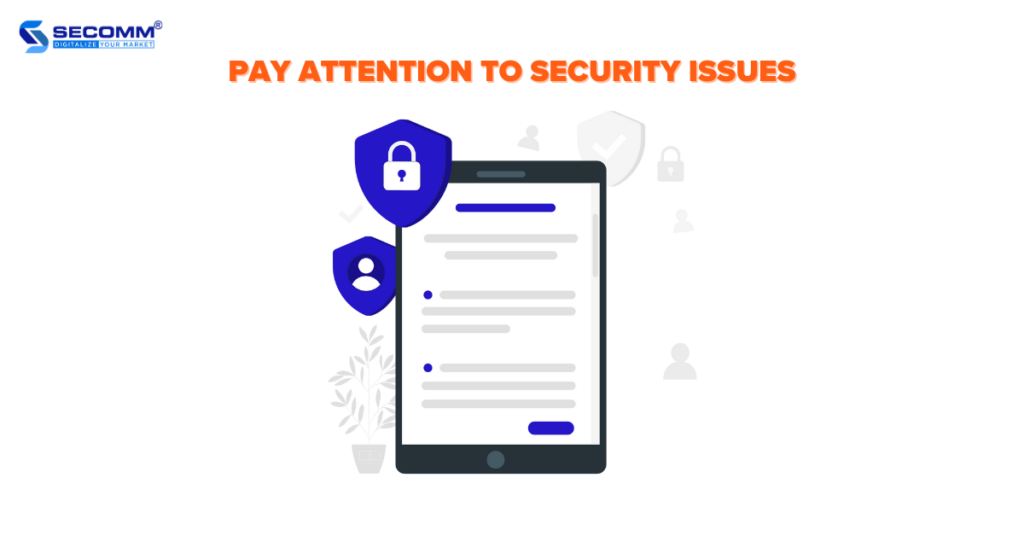
Currently, many CRM solutions are cloud-based, meaning customer data is encrypted and regularly backed up to enhance safety and security. However, you should thoroughly research the provider and understand how their data will be stored and secured in the database. This information is typically available on the CRM provider’s website.
According to G2‘s and rankings based on user satisfaction, here are the top 10 CRM software solutions best suited for large-scale enterprises.
Salesforce Sales Cloud is a part of the renowned Salesforce CRM platform, developed to assist large enterprises in optimizing business operations and maintaining better customer relationships.
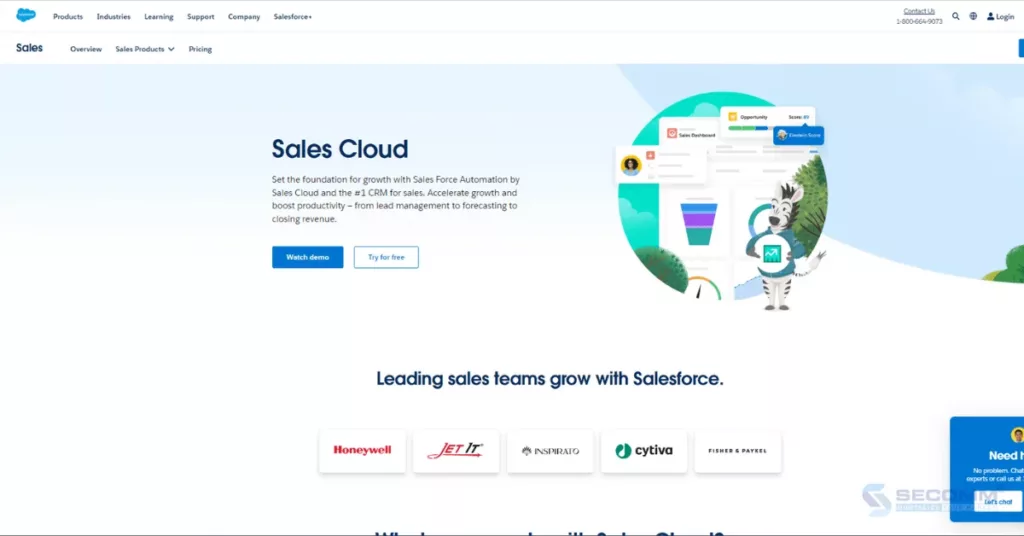
Core features:
Costs:
| Essentials | Professional | Enterprise | Unlimited |
| $25/user/month | $75/user/month | $150/user/month | $300/user/month |
| For small businesses with a maximum of 10 users. | For businesses of all sizes. | For large enterprises with deep customization needs. | For large enterprises with unlimited software usage and demanding support requirements. |
Pros:
Cons:
Recognized as a top on-cloud CRM software for large enterprises, SAP Sales Cloud assists businesses in creating an internal collaborative environment, optimizing business processes, and fostering efficient interactions with customers.
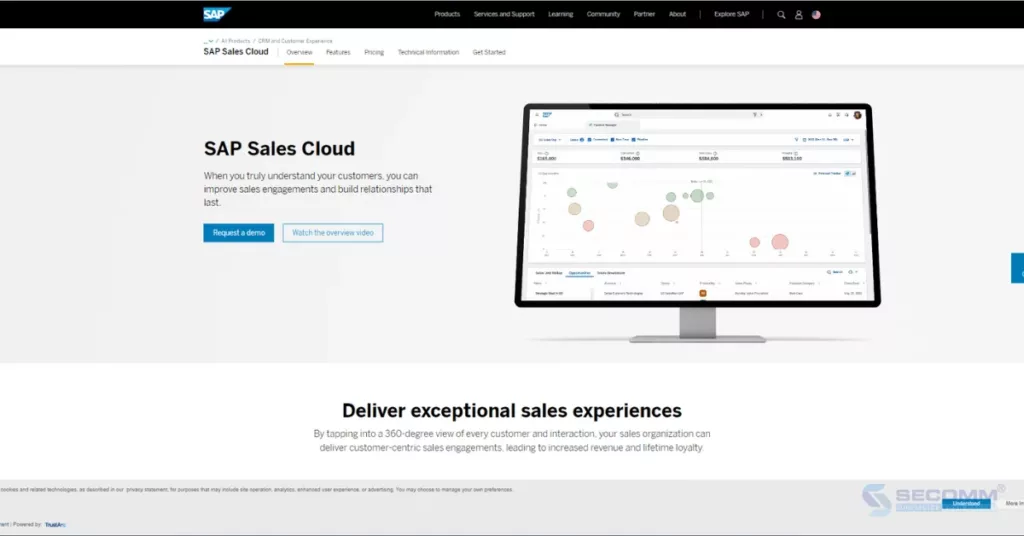
Core features:
Cost: SAP Sales Cloud doesn’t publicly disclose its pricing on the website. Therefore, businesses are advised to contact the provider directly for consultation and a price quote.
Pros:
Cons:
When it comes to leading CRM providers, HubSpot is a very familiar name for most businesses. The HubSpot Sales Hub solution offers businesses outstanding features to build relationships with customers, manage the sales funnel effectively, and close more deals.
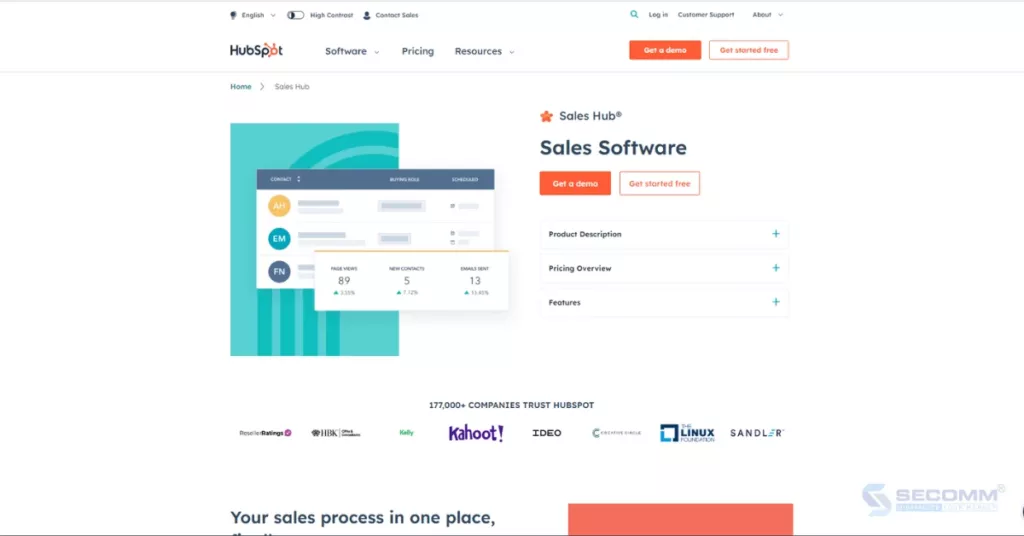
Core features:
Costs:
| Free | Starter | Professional | Enterprise |
| 100% Free | $45/month | $450/month | $1200/month |
Pros:
Cons:
Zoho is a renowned CRM solution with a variety of features designed to suit businesses of all sizes, enabling them to build and manage customer relationships and optimize sales processes.
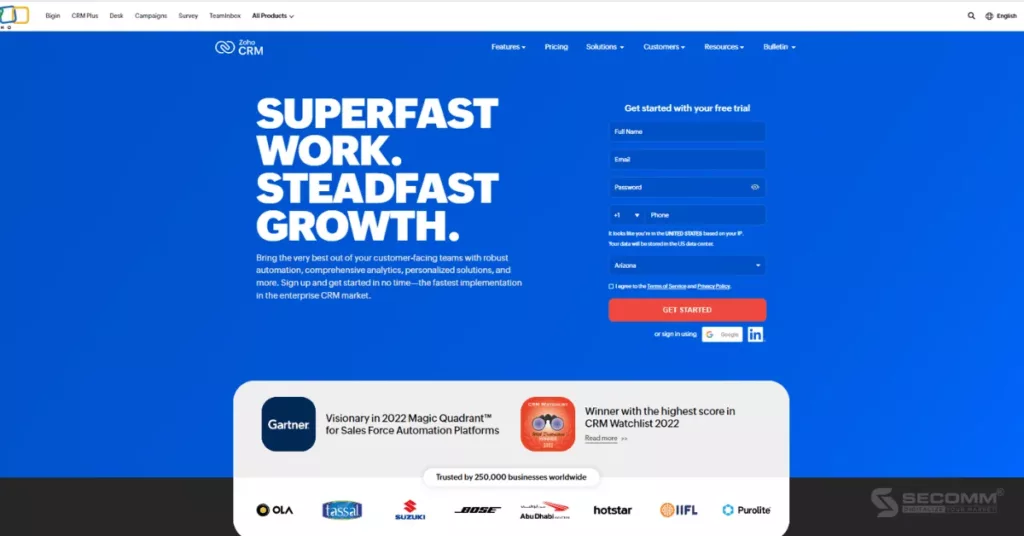
Core features:
Costs:
| Pricing plans | Standard | Professional | Enterprise | Ultimate |
| Billed Monthly | $20/user/month | $35/user/month | $50/user/month | $65/user/month |
| Billed Yearly | $14/user/month | $23/user/month | $40/user/month | $52/user/month |
Pros:
Cons:
Another prominent CRM software for large enterprises is NetSuite CRM. This is a cloud-based CRM platform designed to help businesses manage interactions with current and potential customers, partners, and suppliers.
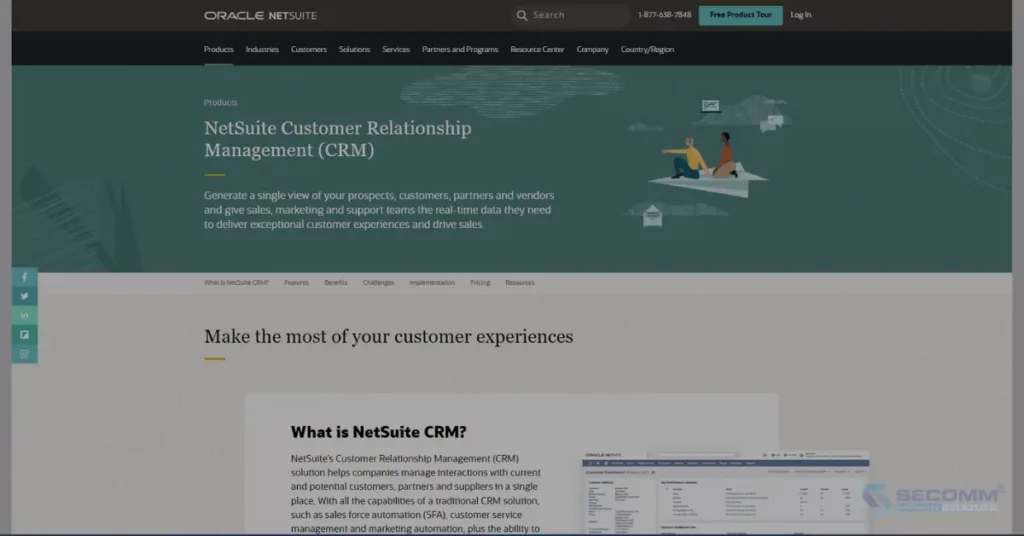
Core features:
Costs: NetSuite CRM doesn’t publicly disclose its pricing on the website. Therefore, businesses are advised to contact the provider directly for consultation and a price quote.
Pros:
Cons:
Related Reading: Explore the 10 best CRM software for large enterprises Pt2
The Bottom Line
Leveraging years of valuable experience supporting various businesses in the deployment of CRM solutions, SECOMM offers valuable insights to help businesses swiftly identify appropriate software and expedite the implementation process.
Contact or call directly to SECOMM’s hotline at 02871089908 for free consultation.
 2
2
 8,811
8,811
 2
2
 1
1Subscribe to get the latest eBook!
Hotline